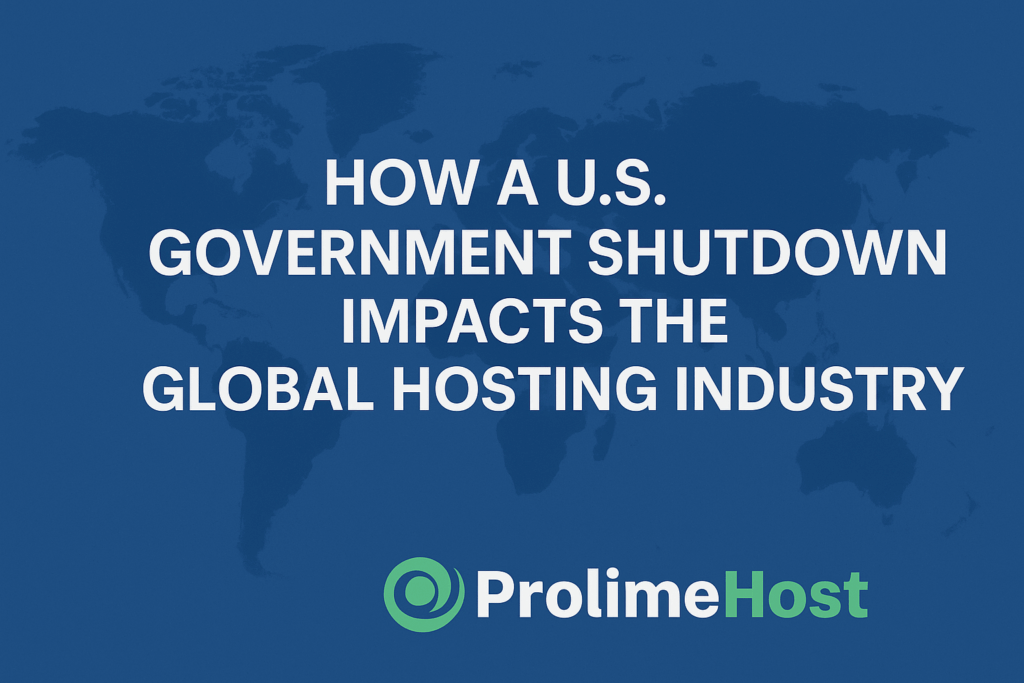
Introduction
A U.S. government shutdown is never a localized event. While the direct consequences fall on federal agencies and their employees, the ripple effects often extend into global industries that rely on America’s regulatory, economic, and technological influence. Among these industries, web hosting and data infrastructure sit at a unique crossroads. Hosting companies power everything from federal IT systems to international businesses dependent on U.S. cybersecurity frameworks, DNS governance, and cloud innovations. The longer a shutdown lasts, the more those ripples spread into the global hosting ecosystem.
The Regulatory Slowdown
At the heart of any shutdown lies the suspension of “non-essential” government functions. For the hosting industry, this often means reduced activity from agencies like the Cybersecurity and Infrastructure Security Agency (CISA) or the Federal Communications Commission (FCC). These organizations help enforce standards, respond to digital threats, and provide oversight on internet infrastructure. With furloughed staff and stalled operations, updates to compliance requirements, cybersecurity advisories, and even spectrum allocations face delays. When these bottlenecks appear in the U.S., they resonate internationally, as global hosting standards often align with American benchmarks.
Government Contracts and Hosting Providers
Many hosting companies work as subcontractors or direct service providers for U.S. federal agencies. A shutdown halts project funding, suspends payments, and freezes procurement pipelines. For global hosting firms with U.S. government contracts, this can mean deferred revenue and delayed deployments. Even companies outside the U.S. that supply or support these contractors may feel the pinch. A prolonged shutdown risks disrupting large IT modernization projects, slowing the adoption of new infrastructure that could otherwise set the pace for the private sector. For context, ProlimeHost has often highlighted how implementing AI with GPU dedicated servers accelerates digital transformation—yet these initiatives also stall when government IT budgets are frozen.
Cybersecurity and Threat Intelligence
Another under-reported consequence is the reduction in cyber threat intelligence sharing. Agencies like CISA often provide real-time alerts and coordinate responses to cyberattacks. During a shutdown, with reduced staffing, the timeliness and reach of these alerts diminish. Hosting providers then face a higher burden in detecting and mitigating threats on their own. For enterprises running sensitive workloads, such as healthcare AI solutions (as explored in our article How GPU Servers Are Transforming Healthcare), this lag in government collaboration introduces unnecessary risk.
Economic Ripples Across the Hosting World
A government shutdown is also a signal to global markets. Confidence dips, project funding slows, and companies delay IT expansion. Hosting providers, particularly those reliant on enterprise clients with U.S. exposure, may see reduced demand for server capacity. If the shutdown drags on for months, this uncertainty compounds, leading to delays in global data center expansion or cross-border IT collaborations. Reports from The Washington Post suggest that cybersecurity agencies are already struggling to maintain coverage, reinforcing concerns that long shutdowns amplify systemic vulnerabilities.
Operational Delays in Domain and DNS Management
A subtler impact appears in the domain name system (DNS) and certificate management. During past shutdowns, government-managed websites have gone dark due to expired SSL certificates or delayed domain renewals. Because many root servers and registry functions are U.S.-based, administrative slowdowns here can ripple into global internet operations. While large commercial registrars maintain redundancy, the interconnected nature of DNS means even small lags can cause instability.
Conclusion and Future Outlook
The global hosting industry is resilient, but resilience does not mean immunity. The duration of a shutdown determines whether impacts are short-term inconveniences or long-term disruptions. A brief pause in government operations may simply delay a few certificates or contract payments. A prolonged crisis, however, can reduce cybersecurity oversight, destabilize procurement cycles, and erode confidence in digital infrastructure. For hosting providers worldwide, awareness and preparedness are essential. Investing in reliable dedicated servers and robust security frameworks ensures continuity, even when geopolitical uncertainty strikes.
FAQs
Q1: Does a U.S. shutdown immediately disrupt global hosting services?
Not directly. Most hosting companies continue to operate as normal, but indirect impacts—such as contract delays and slower threat intelligence sharing—emerge quickly.
Q2: Which hosting providers are most at risk?
Those tied to U.S. federal contracts or subcontracting agreements face the most immediate consequences, though global players may feel delayed adoption in industries like healthcare, finance, and government technology.
Q3: How do cybersecurity risks increase during a shutdown?
With fewer government staff monitoring and distributing alerts, hosting providers may face delayed warnings about vulnerabilities or attacks. This shifts the burden of defense more heavily to private companies.
Q4: What steps can businesses take to mitigate risks?
Businesses should ensure redundancy in hosting infrastructure, stay proactive with private cybersecurity intelligence sources, and partner with providers like ProlimeHost that offer tailored AI-driven server solutions even when external agencies slow down.
Contact Us
Uncertainty is inevitable, but downtime doesn’t have to be. At ProlimeHost, we specialize in future-proof hosting solutions designed to withstand both technical and geopolitical shocks. Whether you’re modernizing infrastructure, deploying GPU servers for AI workloads, or safeguarding sensitive data, our team ensures performance and resilience.
👉 Contact ProlimeHost today to discuss hosting strategies that keep your business stable—no matter what happens in Washington.
You can reach us at sales@prolimehost.com or at 1 (877) 477-9454




